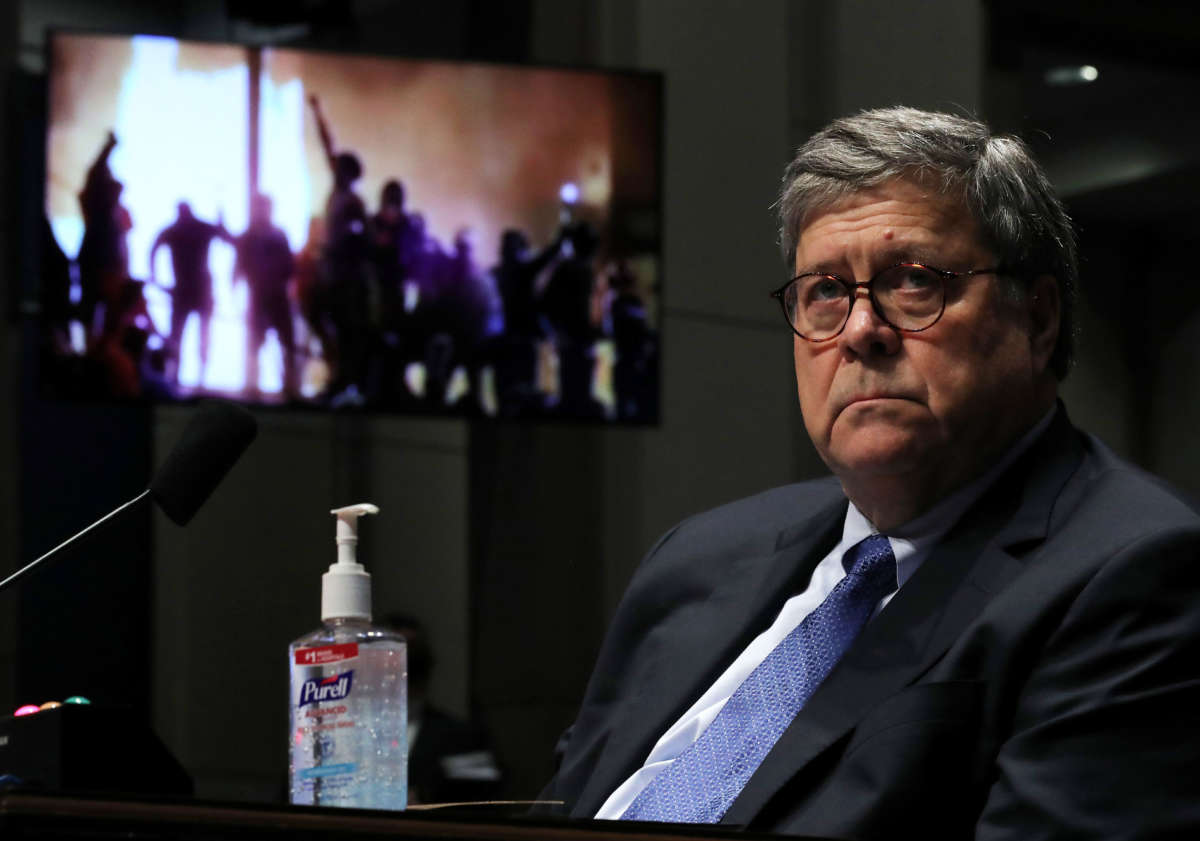In an exchange with Rep. Pramila Jayapal (D-Washington) before the House Judiciary Committee on Tuesday, Attorney General William Barr revealed that he is oblivious to widely reported threats of violence made by right-wing “reopen” protesters, even as he has backed the Trump administration’s vicious crackdown on racial justice protesters.
When asked about the death threats made against Michigan Gov. Gretchen Whitmer by right-wing demonstrators who oppose public health measures taken by the state to curb the spread of COVID-19, Barr said he was not aware that such threats against Whitmer had been made.
Barr’s comment came as he was being questioned about the federal agents that the Trump administration sent to quell protests in Portland, Oregon, and in a number of other cities across the country. Throughout the House Judiciary Committee session, he was also grilled by Democratic lawmakers on issues ranging from the government’s response to police brutality to his controversial interventions in high-profile federal cases.
During her exchange with Barr, Jayapal mentioned a recent phone conversation between Trump and several U.S. governors in which he told them to “dominate” racial justice demonstrators, describing them as “terrorists.”
Because the Trump administration had sent federal agents to Portland, purportedly to protect government buildings there, Jayapal questioned why the administration didn’t take the same action against conservative protesters who opposed precautionary stay-at-home orders from governors to prevent the spread of coronavirus.
In Michigan, for example, protesters, many armed with guns, stormed the capitol building, with some calling for Whitmer to be harmed physically due to her orders.
Jayapal asked Barr if he was aware that those individuals had threatened Whitmer’s life or that they had engaged in other violent rhetoric. Barr, to her surprise, said he was not.
“Major protests in Michigan, you’re the attorney general, and you didn’t know the protesters called for the governor to be lynched, shot and beheaded?” she questioned.
“Well, there are a lot of protests around the United States,” Barr began, but Jayapal stopped him there to give her assessment of what the attorney general had just revealed to her and the world.
“You are aware of certain kinds of protesters, but in Michigan, when protesters carried guns, Confederate flags, and swastikas, and call for the governor of Michigan to be beheaded and shot and lynched, somehow, you’re not aware of that,” she noted.
.@RepJayapal: "You are aware of certain kinds of protesters, but in Michigan when protesters carried guns & Confederate flags & called for the governor of Michigan to be shot and lynched, somehow you are not aware of that … there is a discrepancy." pic.twitter.com/qAr8HGhr1F
— Aaron Rupar (@atrupar) July 28, 2020
Jayapal added that the contrast between Barr’s inaction in Michigan and the administration’s crackdown in Portland lays bare the priorities and loyalties of the White House.
“When white men with swastikas storm a government building with guns, there is no need for the president to ‘activate’ you, because they’re getting the president’s personal agenda done,” she said. “But when Black people and people of color protest police brutality, systemic racism, and the president’s very own lack of response to those critical issues, then you forcibly remove them with armed federal officers [and] pepper bombs because they are considered terrorists by the president.”
Jayapal elaborated on the point she was making to Barr. “You take an aggressive approach to Black Lives Matter protests, but not to right-wing extremists threatening to lynch a governor if it’s for … the president’s benefit,” she said.
For his own part, Barr earlier in the day explained that he disagreed with the premise that there is a systemic problem in policing when it comes to race. “I don’t agree there’s systemic racism in the police department, generally in this country,” he said.
Later in the day, Rep. Sheila Jackson Lee (D-Texas) offered a scathing critique of Barr’s opening statement, saying he had shown once more that he has “no concern for Black lives” by delivering an opening statement devoid of “sympathy and understanding that Black lives matter.”
Join us in defending the truth before it’s too late
The future of independent journalism is uncertain, and the consequences of losing it are too grave to ignore. To ensure Truthout remains safe, strong, and free, we need to raise $29,000 in the next 36 hours. Every dollar raised goes directly toward the costs of producing news you can trust.
Please give what you can — because by supporting us with a tax-deductible donation, you’re not just preserving a source of news, you’re helping to safeguard what’s left of our democracy.
